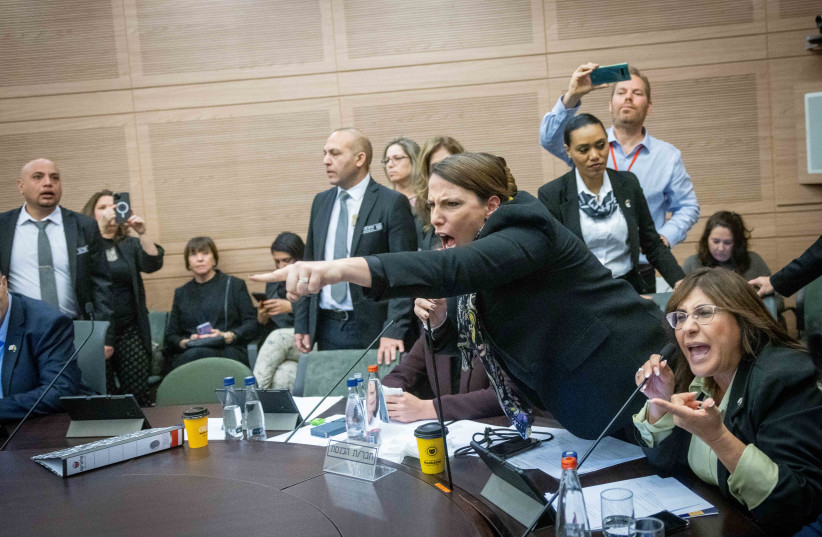Israelis are more optimistic about national security than they were a month ago, but still feel heavily divided, according to the latest Israeli Voice Index poll published by the Israel Democracy Institute (IDI) on Tuesday.
43% of the respondents expressed optimism about Israel's national security in the latest poll, a significant increase from 34% last month.
A slight increase was also noted in the percentage of Israelis optimistic about the future of Israel's democracy, rising from 34-37%.
Concerning the stability of the government, the public is split in its opinion on whether or not the government will last a full term, with 44% saying they believe it will and 43.5% saying the opposite. 12.5%, an unusually high percentage, responded that they are unsure.
Among right-wing voters, 58% said they believe the government will last until the end of its term, while only 27% of center voters and 33% of left-wing voters said the same. When split based on Israelis who voted for the coalition or opposition parties, 65% of coalition voters said they believe the government will last, while only 28% of opposition voters said the same.

The Israeli Voice Index additionally found that 26% of Israelis place trust in the Knesset, an increase from the low point of 14% recorded when the Lapid-Bennett government collapsed and almost as high as when the Lapid-Bennett government was formed.
The public's trust in the Knesset is still very low, however, compared to the past. For comparison, between 2003-2012 40.6% of the public placed trust in the Knesset on average and from 2013-2022 30.5% placed trust in the Knesset on average.
The poll found a significant difference in the trust placed in the Knesset between coalition (39%) and opposition (16%) voters.
The public's trust in the government also rose from 21% in June 2021 to 29% as of May 2023. Only 6% of left-wing voters placed trust in the government, while 48% of right-wing voters felt the same.
Trust in the High Court of Justice remained stable, with 43% of the public expressing trust in the institution. Among coalition voters, only 16.5% placed trust in the High Court, compared to 72% of opposition voters.
Less than half a year before municipalities across Israel are set to hold local elections, the IDI found that over half of Jewish Israelis express trust in local authorities, while only 38% of Israeli Arabs feel the same.
Most Israelis believe government should interfere in internal community matters
When asked if the government should interfere in the internal matters of different communities throughout Israel or not, 53% of Israelis responded that they believe that the government should interfere, while only 36% said the opposite. Among haredim, over 76% said that they believe the government should not interfere, while only 24% of secular Israelis said the same.
The IDI additionally asked respondents if the government should fund schools that don't teach core curriculum subjects, with 55% saying it should not. Among haredim, over 93% said the government should, while only 13% of secular Israelis felt the same.
Israelis believe inter-sector relations are in terrible state, but still want one state
The poll additionally found that relations between the various sectors of Israeli society are in a terrible state, with 67% of respondents saying that relations between the right and left are terrible, 57% saying relations between Jews and Arabs are terrible, 45% saying relations between secular and religious Jews are terrible and 22% saying relations between Ashkenazim and Mizrahim are terrible.
Among Jewish respondents, 59% said relations are in a bad state between Jews and Arabs, while only 44% of Arab respondents felt the same.
When asked if they felt that the state should be split in two - with half being a secular, liberal state based in Tel Aviv and half being a religious, conservative state based in Jerusalem - the vast majority (73%) of respondents rejected the idea, with over half specifying that they "strongly opposed" such an option.
Among left-wing voters, 33% supported such a split, while only 14% of center voters and 13% of right-wing voters felt the same.
When asked if they felt that they are part of a minority group, 51% of Israelis responded that they do not. Among Jewish Israelis, 35% said they felt that they are part of a minority, while 66% of Arabs said the same.
Prof. Tamar Herman and Dr. Or Inabi, who conducted the poll, noted that "It seems that public opinion on the issue of the crisis situation in which Israel finds itself has entered a kind of negative stagnation."
"The data show that each party is entrenched in its positions regarding a wide range of issues, including trust in institutions, the assessment of the government's life expectancy, and more. In addition, there is also a fixation of the concept of the structured conflict between different parts of the population, first and foremost between the right and the left. Only leadership with a comprehensive vision, or alternatively a reality-changing event can thaw this stagnation at this time."
